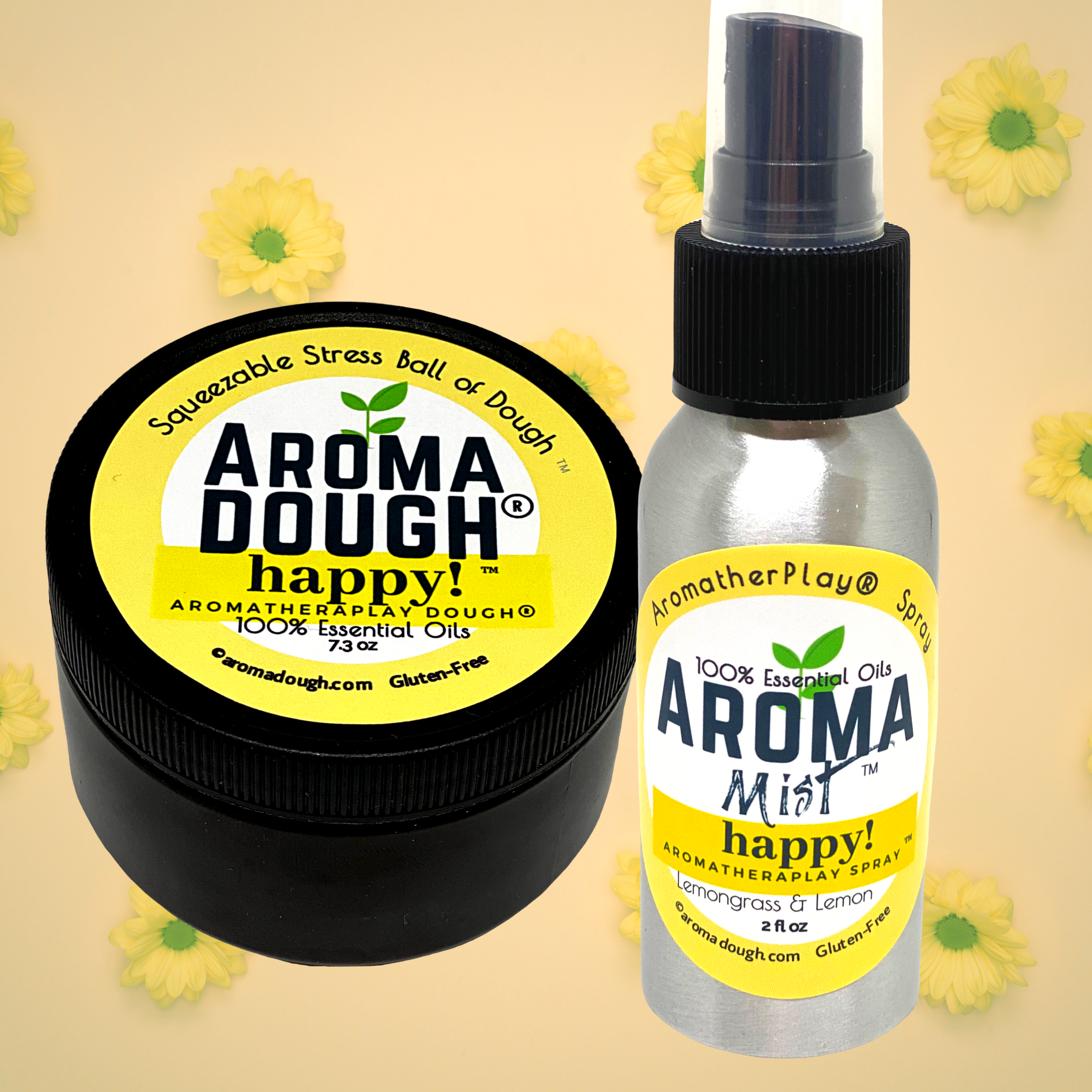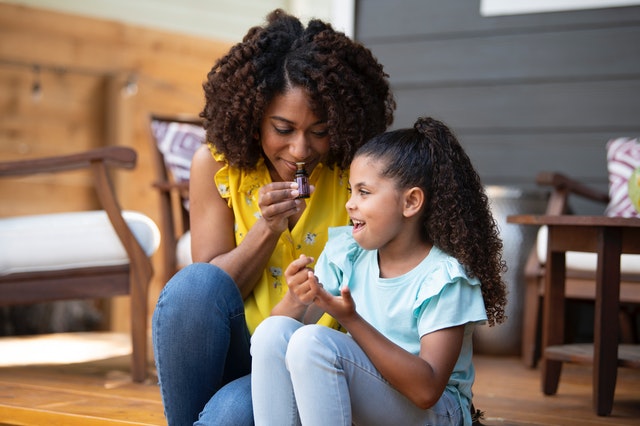Aromatherapy has been around for thousands of years, with some evidence showing that it started with ancient Egyptians who used balms, resins, and oils they made from different aromatic plants.
Throughout the years, people have recognized the
benefits of aromatherapy on promoting certain physical and mental states and reducing stress and anxiety. People still use this therapy, but instead of balms, oils, and reins, they use essential oils.
Essential oils are normally concentrated extracts gotten from leaves, flowers, roots, barks, seeds, or peels of a plant.
This is a practice that goes further than just smelling essential oils because they smell nice. It involves inhaling and topical application to promote general wellbeing, restore balance, and enhance health.
While this is great for adults, it could also be a perfect treatment for children who have ADHD, anxiety, and difficulty focusing.
How Different Scents Help Children
When using essential oils for kids, parents need to know that different scents have different benefits to their children.
• For restlessness and hyperactivity
There are a lot of essential oils parents can use to help their children who are hyperactive and restless relax. Some of the most common ones include lavender, vetiver, roman chamomile, mandarin, and ylang-ylang. They help with relaxation and help your child become quieter and calmer.
Parents can try other scents, including peppermint, eucalyptus, frankincense, lemon, cedarwood, or bergamot.
• Concentration and focus
Experts suggest that parents should make a blend of frankincense, patchouli, lime, Amyris, ylang-ylang, chamomile, and sand wood in a carrier oil. Applying that blend on the kid’s wrist helps them focus all day long.
They can also try blending rosemary and vetiver. Research has indicated that vetiver promotes alertness, focus, and concentration, while rosemary helps enhance cognitive performance. Some other oils parents can try are lemon, cedarwood, and frankincense, either as a blend or individually.
• Worry and anxiety
Anxiety and worry can make it hard for a child to fall asleep. A blend of sweet orange and lavender is one of the best and most effective to help with that. Lavender helps with relaxation, while the sweet orange helps uplift their mood.
Some other oils parents can use include jasmine, valerian, sweet basil, holy basil, patchouli, bergamot, ylang-ylang, rose, chamomile, frankincense, and clary sage.
• Nausea, bloating, and fatigue
These are some of the main symptoms of Celiacs Disease. Some scents that will help with Celiacs DIsease include peppermint, mandarin, and ginger.
Some research also shows that sage, rosemary, and peppermint help boost children’s memory. Experts recommend that parents should involve their children in choosing the aroma they want to use when studying or doing some of their activities.
Fun Activities With Essential Oils For Kids
One of the most common ways parents use essential oils for this type of therapy for their kids is through inhaling and applying it to the skin.
However, they can incorporate these oils in some play activities for their children such that they not only get the benefits of the essential oils but also have fun while doing that. Some of the activities parents can do include:

Modeling Dough Children love playing with modeling dough to make different molds and express their artistic side. Parents can take that a notch by introducing aroma dough or aromatherapy dough to their children. That is therapy dough infused with essential oils.
Parents can buy it in stores or make it themselves at home. All they need is normal aroma dough and a few drops of the essential oil they want to use. If they want a relaxing feeling for their children, they can
use lavender or sweet orange to uplift their mood.
One of the best things about playing with aromatherapy dough is that there is no wrong or right in how a kid chooses to use theirs.
They can use them to try and bake cookies and even sprinkle some seeds on top, either with the same scent as the essential oil or a different scent. Parents can take the game up a notch and make it a
germ-baster game.
That involves the parents sticking pompoms or other small items into the aroma modeling dough and asking the children to pick them out and place them in a different container. They can even tell the kids to sort them out by color.
That is not only fun but also helps increase the child’s concentration, eye-hand coordination, and other motor skills.
Once the therapy dough infused with essential oils gets old, and the colors start to mix together, parents should not throw it away.
Instead, they can decide to play wild things, where they lead their children in making monsters and other wild things. All they need is to add other supplies like eyes and feathers.
Glitter slime Apart from aromatherapy modeling dough, another activity children will enjoy a lot is
glitter slime. Playing with slime is naturally relaxing. Since it is thick and resistant, it provides a lot of joint compressions and deep pressure.
Therefore, as children roll, fold, squeeze and pull the slime, it sends signals to the brain that have a calming effect and increases focus. Also, the child’s mind is taken off guard when they start playing with the slime.
That sends signals to the brain that they are not in danger, which immediately gives a calming effect. Parents can add to the benefit of the smile by adding a few drops of their preferred essential oils, depending on what they want to trigger in their children.
Scented bubbles Everyone loved blowing bubbles when they were kids. This is another fun activity parents can do with their kids because it is a great way of calming them down and slowing down their breathing.
All the parents need to
make the bubbles is lukewarm water, corn syrup, unscented dish soap, essential oil of their choice, and food coloring. They then have to mix the water, corn syrup, and dish soap together.
After they are all mixed, they can then add a few drops of the essential oil and food coloring. The essential oil parents choose depends on the effect they want it to have on their children.
 Guess the scent
Guess the scent This is a game where parents hold different essential oils to their children’s noses and ask them to guess the essential oil based on the smell. The game not only plays as an important bonding activity between the parent and the child, but it also helps increase their concentration and focus.
It is also a great way to boost the child’s memory. Parents can add some relaxing essential oils and include this game in their children’s bedtime routine to help them relax before they sleep.
Salt tray writing activity These are perfect for helping with writing practice for kids. It has a sensory aspect and is also a great way for parents to bond with their children. It is a great way for children to practice their writing and spelling skills.
Once in a while, parents can also switch the activities with some math.
Salt trays help increase the focus, concentration, and memory of children by adding some essential oils; it also helps relax and improve their mods.
Safety Tips When Using Essential Oils For Kids
While essential oils have numerous benefits for children, some of the things parents should do to ensure that they use them properly and safely include:
• Do not use peppermint oil for children younger than 30 months because it could increase their chances of getting seizures.
• Avoid using undiluted essential oils on the skin or in bath water because that could cause irritation and allergic reactions. The recommended dilutions for essential oils to use on kids range from 0.5 to 2.5%, depending on the kid’s age and weight.
To dilute the essential oils, parents can add them to lotion or carrier oils.
• Before using essential oil or anything with essential oil, test it on a small patch of skin to ensure there are no reactions. That is because even in their dilute state, some essential oils can cause reactions in children. If you notice any reaction, remove the oil and wash the skin with water and soap.
• Do not use essential oils on drinks and foods because they can be toxic if children ingest them.
• Do not use essential oils on the face as they can irritate the eyes, nose, and ears.
• Since essential oils are flammable, parents should avoid using them near fires to avoid starting a fire.
• Always read the instructions for every essential oil as some do not like direct sunlight.
• Store essential oils in a dry and cool place, away from the reach of children.
• Buy essential oils from reliable sources. That is because there are many people in the market selling them, and some may contain chemicals and contaminants.
To determine a credible source, look for one that lists the ingredients, scientific name of the oil, the source, and contact information in case of any questions and concerns.
• Consult a healthcare provider or professional aromatherapist before using essential oils on kids. That is mostly if the child has any health issues like breathing problems and respiratory limitations.
Parents should also explain the issues they aim at solving with the essential oils, like ADHD, anxiety, concentration, stress, and insomnia. The doctor explains some of the best oils or combinations of oils to use.









